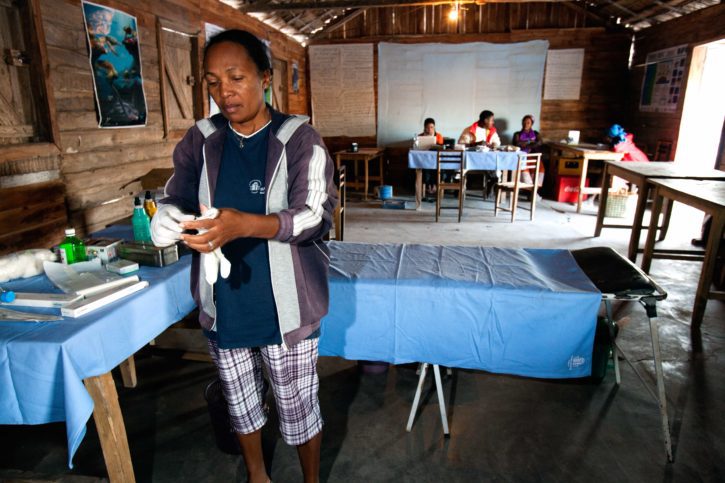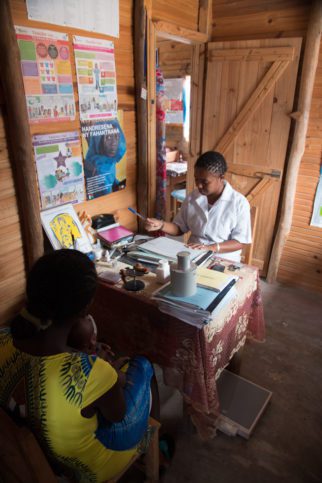World Aids Day on December 1st is to remind the world that HIV has not gone away and that the virus still threatens people worldwide. An estimated 38 million people are currently living with HIV and we want to continue raising awareness about it because one of the major contributors to the spread of HIV is people not knowing the facts about how to protect themselves and others. Stigma and discrimination are also all too common for many people living with the condition and those seeking treatment. This year’s focus for World Aids Day is to recognise and address the inequalities which are holding back progress in ending Aids and equalise access to essential HIV services. Through our close links to communities in the countries where we work, we know that HIV/Aids affects many fishing communities. In this blog, our director of Community Health, Dr. Vik Mohan explains the links between marine conservation and HIV in coastal communities, and our work on HIV and Aids in Madagascar.

We have been supporting community health in remote coastal communities where we work in Madagascar for more than 15 years to ensure people have access to basic health services.
We’ve been involved in promoting HIV and Aids awareness in Madagascar for many years. Over the past year, we’ve been stepping up our HIV programme by focusing on building capacity at community-level for treatment.
HIV/Aids is a growing and unseen epidemic and the highest increase is on Madagascar’s west coast of Madagascar, according to Ministry of Health data. In terms of ocean conservation, there’s evidence from research done in Kenya that people living with HIV are more inclined to engage in destructive fishing practices than people who are healthy. People who are ill as a result of HIV are less likely to comply with marine protection measures and more likely to engage in disruptive, unsustainable fishing because they just need to get food on their plates.
So HIV is both a public health and marine conservation issue, and this is why we are rolling out our programmes that support communities along the west coast. We’re leading the charge on testing, surveillance, and treating in the areas in Madagascar where we work, currently reaching around 120,000 people. At the community level, we’re promoting awareness about the risks of HIV and the importance of testing, and we’re training community health workers to promote attendance at community health clinics, where we’re ensuring people have access to testing. We’re training clinic staff on how to counsel community members and how to test, and also building capacity for HIV treatment at these clinics.
Until recently, if you wanted treatment, you’d have to travel miles to a treatment centre, and everyone would know you were going there for your HIV treatment, so nobody would go. Now you can get treatment and surveillance in your community for the first time, and it’s confidential. There is still a lot of misunderstanding about HIV and how treatment works, and it remains a deeply stigmatised condition. We need to go the extra mile to ensure people living with HIV feel that they can access treatment in complete confidence. That’s not just a personal health issue; that’s a public health issue because if they don’t get treatment, they could pass it on. We must ensure that people’s rights to health care and confidentiality are protected and upheld.

We have been supporting community health in remote coastal communities where we work in Madagascar for more than 15 years to ensure people have access to basic health services.AIDS
We realised that if we are asking communities to engage in the complex, long-term work of rebuilding fisheries, protecting ocean life, and managing marine resources, we cannot expect them to do that if their basic needs aren’t met. It’s simply not realistic to expect communities to do this. So we had to think holistically about the needs of communities just in the same way we think holistically about the threats facing ecosystems. And it’s only when you work to address the issues that communities perceive as important that you can expect communities to partner with you. So it’s about getting alongside communities, listening to them, addressing their needs, building trust for a long-term partnership, and building capacity for engaging in this complex long-term work, which includes removing poor health as a barrier to engagement.
Blue Ventures and our partners have seen that poor health is a barrier to engaging in marine conservation. Addressing the health of communities and the health of marine ecosystems are not separate tasks. The well-being of communities is inextricably linked to the well-being of marine ecosystems and we are committed to acting holistically to support thriving fishers and thriving oceans.
Find out more about World Aids Day and how you can help raise awareness.
Read more about HIV/Aids in Madagascar: Is HIV a hidden epidemic in Madagascar?
Learn more about Blue Ventures’ community health work

